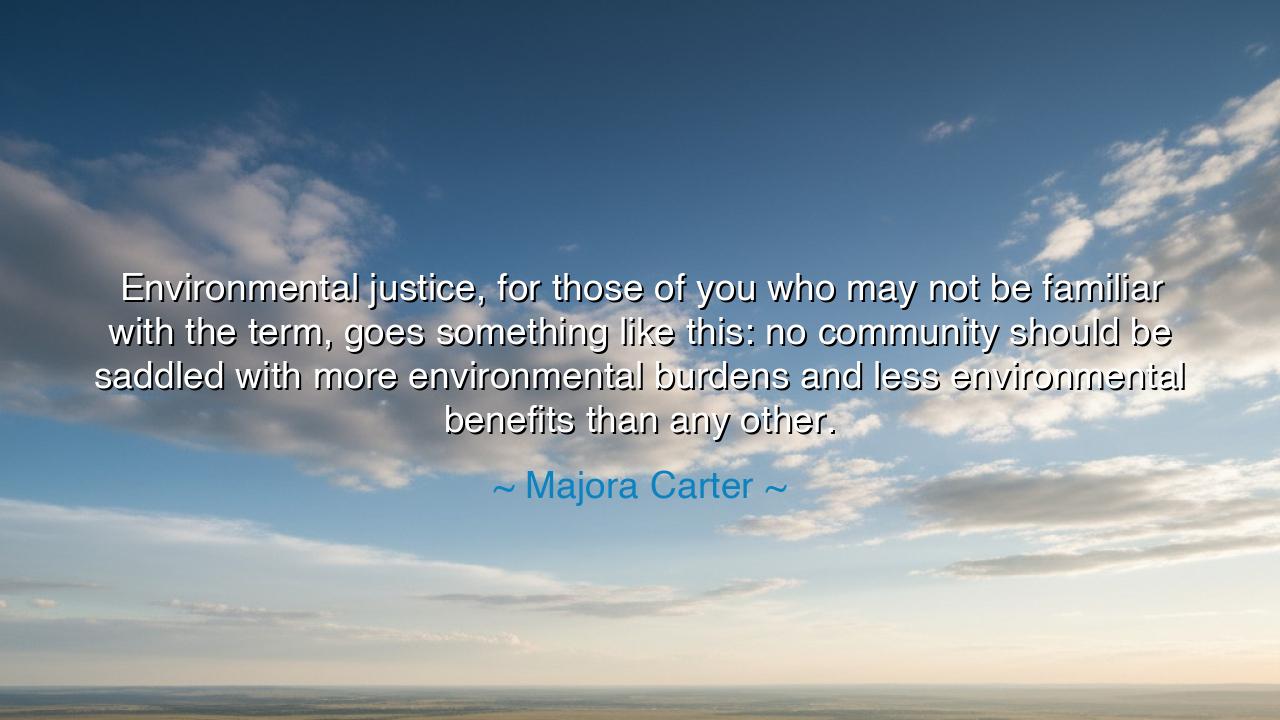
Environmental justice, for those of you who may not be familiar
Environmental justice, for those of you who may not be familiar with the term, goes something like this: no community should be saddled with more environmental burdens and less environmental benefits than any other.






Majora Carter, a warrior for her community and for the earth, once declared: “Environmental justice, for those of you who may not be familiar with the term, goes something like this: no community should be saddled with more environmental burdens and less environmental benefits than any other.” Her words are not mere theory but a cry born from lived struggle, for she herself grew up in the South Bronx, a place where pollution, neglect, and poverty weighed heavily upon the people. In this single phrase she names both injustice and hope, laying bare a vision of fairness that transcends her city and belongs to all humankind.
To speak of environmental burdens is to recall the poisoned rivers, the smoke-darkened skies, the waste sites and highways that have too often been forced upon the poorest neighborhoods. Such burdens are rarely spread evenly. The wealthy live where trees shade the streets, where parks breathe life, where clean water flows; the poor live where factories roar, where garbage piles, where toxins seep into the soil. Carter’s wisdom is to call this what it is: not an accident, but injustice—a deliberate imbalance of harm and care.
When she invokes environmental benefits, she reminds us that nature itself is a blessing, a source of health and joy that should not be reserved for the few. A park is not simply grass and benches; it is a sanctuary where children play and elders rest. Clean air is not only invisible—it is life itself filling the lungs. Access to safe water is not a luxury but the foundation of survival. To deny these benefits to one community while granting them freely to another is to wound the very idea of justice.
History gives us countless examples of such imbalance. In the industrial age of Britain, the slums of London choked with coal smoke while the aristocracy retreated to countryside estates of clear skies and fresh air. In America, toxic industries were often placed near communities of color or the poor, while wealthier areas saw zoning that preserved green space. Even today, one need only look at Flint, Michigan, where poisoned water flowed for years into the homes of working families, while safer systems supplied more affluent neighborhoods. Such is the stark reality of Carter’s call for environmental justice.
Yet history also gives us heroes who sought to right these wrongs. The civil rights leaders of the 1960s, though fighting primarily for racial equality, often spoke of the right to live in dignity, which includes the right to clean air, safe water, and healthy surroundings. Wangari Maathai of Kenya, through her Green Belt Movement, restored millions of trees to her country and tied ecological renewal to the empowerment of women and the poor. Majora Carter stands in this tradition: one who does not separate the health of the earth from the health of the people.
The emotional force of Carter’s words lies in their fairness. She does not demand that one group suffer for the sake of another, but rather that no group be forced to carry more than its share. This is a principle as ancient as the scales of justice carved into the temples of Greece: balance must be maintained, or society itself falls into ruin. When some are buried in burdens while others bask in benefits, resentment grows, health declines, and the bonds of community unravel. True peace can only come when all are lifted equally.
The lesson for us is clear: justice must include the earth. When we advocate for fairness, let us not forget the air we breathe, the water we drink, the soil from which our food is grown. If you live where trees grow and parks flourish, consider how you might help those whose neighborhoods are choked by fumes and devoid of green. If you enjoy clean water, speak for those who are denied it. Support policies, organizations, and movements that carry forward the vision of environmental justice.
So let Majora Carter’s words be remembered as both warning and hope: no community deserves to be left behind, no people deserve to bear the burdens while others enjoy only the benefits. To fight for environmental justice is to fight for the wholeness of humanity, for a balance between earth and society, and for a future where fairness is not only written in law but lived in the breath of every person, under skies that belong equally to us all.






AAdministratorAdministrator
Welcome, honored guests. Please leave a comment, we will respond soon